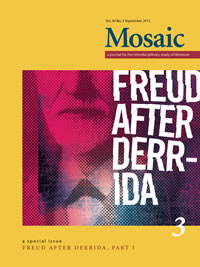Issue 44.3
Overview

Special Issue: Freud After Derrida Proceedings Issue, Part 1
Published: September 2011
View the issue introduction or see the issue summary and contents below.
12 essays, totalling 224 pages
$24.95 CAD
This is the first of two special issues that publish proceedings from the Mosaic October 2010 Freud After Derrida conference. Three of the conference keynote speakers and nine presenters are featured in this issue, which addresses such themes as: inheritance, the death-drive, Freud's Beyond the Pleasure Principle, that text's story of the fort/da game, sovereignty, photography, telepathy, democracy, autoimmunity, animal transference, justice, and the unconscious.
Sidestepping: “Freud After Derrida”Samuel Weber The thought of Freud accompanied the work of Derrida from beginning to end, even if its “concepts,” as Derrida wrote, were “inadequate” to the task it had set for itself. Derrida’s own notion of “auto-immunity” can thus be seen as an effort to rethink and elaborate the implications of Freud’s notion of a “death-drive.” But Freud’s concepts can also serve to rethink Derrida’s own project as well. Each comes and is “after” the other. | |
Pulling Strings Wins No WisdomDavid Farrell Krell As its title indicates, the paper retells the oldest tale of Freudian psychoanalysis, that of the fort/da game, in which an infant pulls the string of its toy in order to win back its absent mother. Derrida loved this story—perhaps because he knew that no philosopher ever gets much beyond infancy. | |
Built upon Love: Towards Beauty and Justice in ArchitectureAlberto Pérez-Gómez This essay proposes a philosophical meditation about the connections between beauty and justice, ethics and poetics in architecture. This reflection is urgent in view of our complex political environment and the prevailing obsession with digital tools at the expense of serious thinking in architectural production. | |
Prophetic Literary Authority and the American Messianic ConsciousnessAaron Mauro In the often unanticipated interstices of reading Derrida reading Freud, this essay broods upon the rhetorical appeals to literary and political prescience in America. | |
When It All Suddenly Clicked: Deconstruction after Psychoanalysis after PhotographyMichael Naas In this essay, I argue that several of Derrida’s central motifs—from supplementarity to différance—can best be understood today in the light of the radical rethinking of time offered by psychoanalysis and, especially, by photography. It is as if, I will argue, the fundamental notions of deconstruction “itself” could come to light only in a time that was not contemporaneous with itself through the supplement of psychoanalysis and the technical inventions of photography. In other words, it took time for it all suddenly to click. | |
Being, Sovereignty, Unconditionality: Heidegger’s Walten in Derrida’s La bête et le souverain IIRonald Mendoza-de Jesús In this essay, I trace Jacques Derrida’s argument in La bête et le souverain II regarding the crucial role that the German verb walten plays in Martin Heidegger’s writings. I argue that Derrida’s attempt to read Heidegger’s Walten provides a crucial articulation of his thinking of sovereignty and unconditionality. | |
Politics after the Death of the Father: Democracy in Freud and DerridaAndrew Ryder Freud hypothesizes that civilization originates with the murder of the primal father. Derrida argues that this murder finds its repetition in the execution of Louis XVI and, drawing on Freudian considerations of the problem of violence, derives an account of democracy as impelled by this death. | |
Being Just with Freud…after DerridaJeffrey Powell What might it then mean to be fair with Freud, to give justice to Freud, to do justice to Freud, to be just with Freud? What, then, of justice? More precisely, if there is to be a call to be fair to Freud, to do justice to Freud, ultimately to be just with Freud, must we not first think what justice might mean for Freud so that we might be just along with him? After Derrida, my essay attempts to read Freud to discover such a notion. More specifically, my reading will draw on Civilization and Its Discontents, the two essays on war, and Beyond the Pleasure Principle. | |
“No Outside of Psychoanalysis”: Towards a Grammatological Concept of the UnconsciousHenrik S. Wilberg This essay proposes a new reading of the relation between deconstruction and psychoanalysis. Rejecting the terms of the previous confrontations between the positions of Derrida and Lacan, the essay seeks to show how the scope of what Derrida proposed under the title of grammatology can be extended beyond the limits of the “Freudian impression” and provide a key to understanding the complex topological notions Lacan developed in his later years. | |
Animal Transference: A “Mole-like Progression” in C.J. CherryhLynn Turner This essay follows the science fiction of C.J. Cherryh after Freud after Derrida in order to draw attention to the non-human limits of writing. The delay to which any and all writing is subject, even a total delay, is brought into particular focus through the psychoanalytic investment in transference. | |
Now X: Freud Writing after Derrida/Virgil Reading before AugustusIka Willis In Of Grammatology, Derrida writes in passing that Freud’s concept of Nachträglichkeit or “deferred effect” fundamentally reorganizes our understanding of the successive or linear nature of time. In this essay, I trace the nonlinear time of Nachträglichkeit in Jean-Dominique Ingres’s painting Virgil Reading the Aeneid Before Augustus and its intertexts. | |
Autoimmune Illness as a Death-drive: An Autobiography of DefenceAlice Andrews This essay returns Derrida’s metaphor of autoimmunity to its biomedical origins and explores how various autobiographical narratives of autoimmune disease can provide a novel reading of Derrida’s deconstruction of the Freudian death-drive. I argue that Derrida’s autoimmunity autoimmunely secures the risks of psychoanalysis, science, science fiction, and deconstruction itself. |